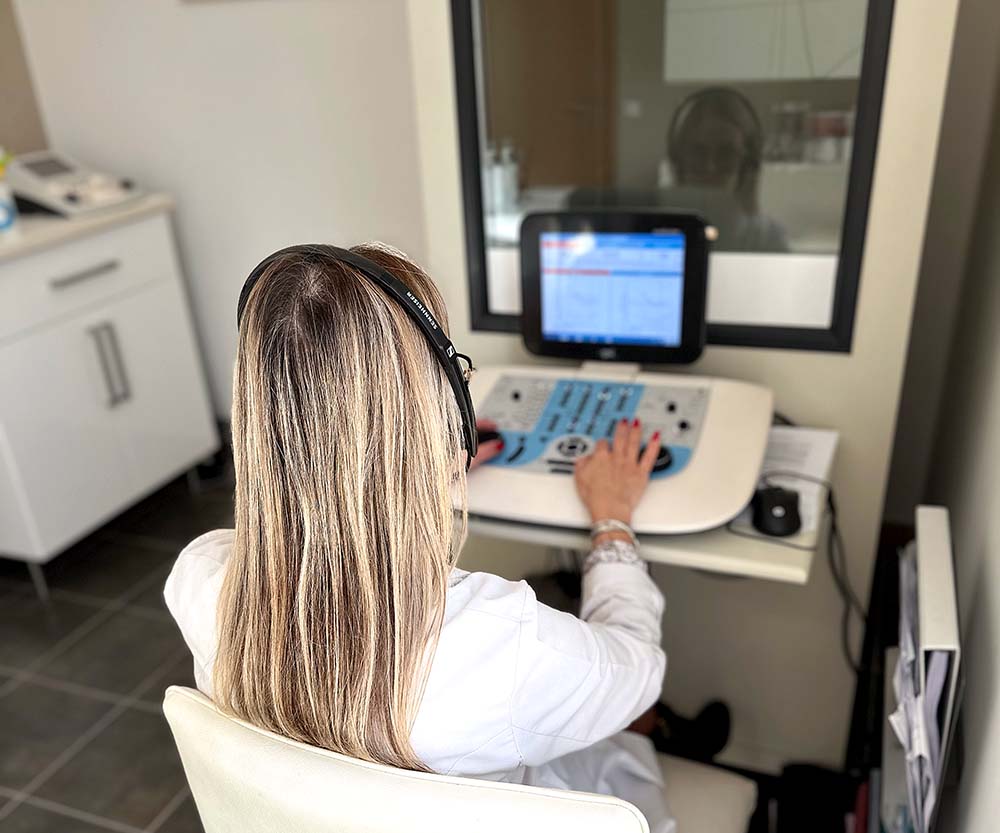
Call Us
Call to national mobile network
Write
Find Us
Call Us
Call to national mobile network
Write
Find Us
Call Us
Call to national mobile network
Write
Find Us
High-frequency audiometry extends the range of traditional hearing tests to cover ultra-high frequencies beyond 8 kHz, typically between 9 kHz and 16 kHz. This enables early detection of hearing loss caused by factors such as noise exposure or ototoxic medications before damage affects speech perception.

assesment
High-frequency audiometry assesses the quietest tones a person can hear at frequencies higher than those tested in standard audiometry. Using specially calibrated headphones in a sound-controlled booth, tones are presented sequentially, first increasing and then decreasing in intensity to determine hearing thresholds for each ultra-high frequency. These thresholds are then compared against age-appropriate norms and recorded baselines to identify early auditory impairment.
impact
High-frequency audiometry serves several essential clinical purposes. In patients receiving ototoxic drugs—such as certain chemotherapy agents or antibiotics—the earliest damage often affects high frequencies. Detecting this allows clinicians to adjust treatments and prevent further hearing loss. For individuals working in noisy environments, such as industrial workers, musicians, military personnel, or frequent headphone users, high-frequency audiometry reveals early noise-induced damage. In cases of tinnitus or complaints of hearing difficulty in noisy environments despite normal standard audiograms, this test clarifies whether underlying ultra-high frequency loss may be contributing.
for you
High-frequency audiometry is particularly valuable for specific populations. Those undergoing treatment with ototoxic drugs can benefit from early detection and intervention. Workers exposed to industrial noise, military personnel, musicians, and frequent headphone users gain from early diagnosis, enabling preventive strategies. Older adults may use high-frequency audiometry to track age-related hearing changes and differentiate them from other causes. Even patients with normal speech-range audiograms but auditory complaints may discover subtle issues through this test.
How Audiocare Performs High-Frequency Audiometry
At Audiocare, patient comfort and understanding are our priorities. The process begins with a clear explanation of what the test entails. Using specially calibrated high-frequency headphones and a sound-proof booth, the audiologist presents pure tones at ultra-high frequencies and records the listener’s responses. The test adds only a few minutes to a standard audiological evaluation. Results are interpreted using age-referenced norms and compared against previous assessments for any changes over time.
Benefits to Patient Care
Including high-frequency audiometry in audiological assessments provides multiple benefits. It allows early detection of damage well before speech-related hearing is affected, giving clinicians an opportunity for timely intervention. It clarifies unexplained symptoms like tinnitus or difficulty hearing in background noise. It supports tailored advice on hearing protection and, where relevant, medication adjustments when early loss is detected. Overall, this approach enriches clinical insight and empowers patients with actionable information.
Don’t wait to take control of your hearing health. Book your appointment today and take a proactive step towards maintaining and improving your hearing. With AudioCare by your side, you’ll have expert guidance and heartfelt care at every turn on the path to better hearing.
Initial Consultation
At first, an anamnesis is carried out by a health professional with the patient, which is intended to be an initial point in the diagnosis.
Diagnosis
Primary and complementary tests are carried out to diagnose the type of hearing loss that will explain why it is difficult to hear.
Recommendation
According to the results of these tests, if hearing loss is proven, a hearing aid will be recommended, which may vary in type and model.
Testimonials
Robert cleared my ear wax. Perfect
Great service
Excelentes profissionais!
Sehr freundliche Bedienung und Hilfreiche Betreuung. Mir wurde mein Hörgerät trotz anderen Fabrikates repariert. Sprachliche Verständigung auch in Deutsch möglich. Kann ich nur empfehlen.
Uitstekende manueel therapeut.
Very professional service. Kate was very pleasant. Unfortunately too expensive for my budget.
Uma simpatia e com muito conhecimento do assunto . Fácil estacionar e gratuito.
Super Service. Sehr gute Betatung
My husband is very pleased with his new ears.
Extremely knowledgeable and friendly people gave fantastic advice & reasonably priced.
Great physiotherapist. My Family has been going there for years.
Professional Advice
Whether you’re exploring our bespoke services, our approach, or how we can elevate your hearing experience, here are answers to the questions we’re asked most often.
Many patients feel anxious before an audiometry test, fearing discomfort or even permanent damage. In reality, HFA is non-invasive and painless: you’ll hear pure-tone beeps and respond when you detect them. The process is calm, guided by your audiologist, and designed to be stress-free—even people with test anxiety report it as a “pleasant game.”
Not necessarily. HFA measures ultra-high frequencies that many adults naturally struggle to hear—especially as they age. Difficulty hearing these tones could simply reflect age-related changes. However, if you’re in a high-risk group (e.g., exposed to loud noise or taking ototoxic medications), the test helps identify early signs of damage. Your audiologist compares your results to age-matched norms to distinguish harmless changes from those requiring follow-up.
Yes. Many people report normal hearing in quiet settings but struggle to understand speech in background noise. HFA can reveal subtle high-frequency losses that affect speech clarity in real contexts. Studies show that even young adults with normal traditional audiograms often have early high-frequency hearing loss, which correlates with difficulty hearing in noise.
Absolutely. Drugs like chemotherapy agents and loop diuretics can damage hearing at ultra-high frequencies first. Similarly, frequent exposure to loud noise—such as from concerts, machinery, or headphones—can cause early high-frequency loss that standard audiometry misses. HFA allows early detection so steps can be taken to protect your hearing before the damage worsens.
Early detection is your advantage. If HFA indicates high-frequency decline, your clinician can adjust your treatment plan—like switching medications or reducing exposure to loud environments. Hearing protection becomes a priority, and, if needed, tailored interventions like frequency-preserving hearing aids may be suggested. Early intervention helps maintain your long-term hearing health and quality of life.
Stay informed with the latest insights and innovations in hearing care, helping you enjoy life fully and with clarity in an ever-evolving world.



Typically replies within an hour
I will be back soon
Adding {{itemName}} to cart
Added {{itemName}} to cart